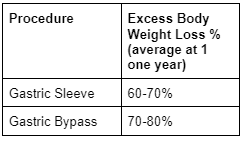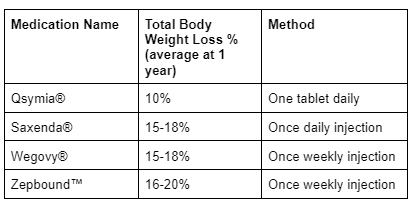
Should I try Weight Loss Surgery or Weight Loss Medications?
Trying to decide between weight loss surgery or weight loss medications? Both bariatric surgery - gastric sleeve and gastric bypass - and prescription weight loss medications are tools to help you reach a healthy weight; but they work differently and lead to varying amounts of weight loss.
Here are a few things to consider when making the decision.
Understand How Each Helps You Lose Weight
Gastric sleeve and gastric bypass both create weight loss by decreasing the size of your stomach, which limits the amount of food you can eat at one time, leaving you feeling fuller sooner and longer. Gastric sleeve jumpstarts weight loss by removing a portion of the stomach reducing the capacity for food intake, whereas gastric bypass works by both reducing the stomach size and rerouting the path food normally takes so that it “bypasses” a large section of the stomach and a portion of the intestine. Both decrease your levels of hunger hormones so you will feel less hungry. As you eat less food, your body will stop storing excess calories and start using its fat supply for energy.
Gastric sleeve and gastric bypass procedures result in significant long term, sustainable weight loss, on average between 60-80% of excess body weight. To calculate your potential weight loss with gastric sleeve, click here. For gastric bypass, click here.

Prescription weight loss medications aid in weight loss by decreasing hunger hormones while simultaneously increasing feelings of satiety, leading to reduced food intake then ultimately weight loss. Qsymia® (phentermine & topiramate), Saxenda® (liraglutide), Wegovy® (semaglutide) and Zepbound™ (tirzepatide) are FDA-approved weight loss medications prescribed in either weekly/daily injections or capsules. These anti-obesity medications are not meant for short term use but rather long term use and once medication is stopped, the feeling of satiety decreases and food cravings increase, which ultimately leads to weight regain. The total body weight loss typically ranges between 10-20%. See the chart below for comparison.

To calculate your potential weight loss with prescription medications, click here.
Do I Qualify?
For weight loss surgery patients qualify with a body mass index (BMI) of 40 and above, or 35 and above with obesity-related conditions such as high blood pressure, diabetes, or obstructive sleep apnea. Find out if you qualify and calculate your BMI here.
Patients qualify for prescription weight loss medication with a (BMI) of 30 and above, or a BMI of 27 and above with obesity-related conditions mentioned above. Find out if you qualify for medical weight loss here.
Costs and Insurance Coverage
For many people, weight loss surgery is an affordable health option because it is covered by their health insurance plan. However, while medical benefits usually cover the majority of the surgical costs, there may be out-of-pocket expenses depending on the procedure and your specific policy. Since coverage for each individual policy varies by company and employer, our staff will determine your exact coverage prior to your first appointment. Our navigators have a very high authorization success rate and regularly work with many insurance companies.
While some insurance plans cover weight loss surgery, coverage for prescription weight loss medications may vary. It’s important to contact your insurance provider beforehand to find out if you have coverage for weight loss medications. If you do not have coverage, self-pay options are available.
Getting Started on Your Weight Loss Journey At NJBC
Both medical weight loss and surgical patients start the process with routine lab work for our physicians to gain a better understanding of their health. This information along with your weight loss goals helps our doctors develop a plan that’s right for you.
With weight loss surgery you will meet with your surgeon, and then be teamed up with an experienced patient navigator who will be your guide, scheduling preoperative appointments, answering questions and ensuring all insurance and clinical requirements are met. After surgery, at your follow-up appointment our team will help you adjust to your new lifestyle.
With prescription weight loss medications, once you have verified your medication coverage with your insurance provider and completed routine lab work you’ll meet with our doctor to review lab test results and medication options. Once a medication is prescribed, NJBC’s medical team will meet with you monthly to monitor and review your progress.
Finding Weight Loss Success
The journey to weight loss doesn’t end when you decide on weight loss surgery or medication. Achieving and maintaining your weight loss goal requires a comprehensive approach along with nutrition support and lifestyle changes. At NJBC we understand what it takes to achieve long term weight loss success.
With more than 20 years experience, we’ve developed medical and surgical weight loss programs that go beyond the operating room and a prescription. Our team of experienced physicians, physician assistants and registered dietitians provide patients with additional tools - exercise and nutrition classes, support groups, and a wealth of educational resources. We will help you make the decision that’s right for you and support you throughout the entire journey.
Interested in learning more about your weight loss options? Give us a call at 908-481-1270.
Source
Eisenberg, D., Shikora, S. A., Aarts, E., Aminian, A., Angrisani, L., Cohen, R. V., de Luca, M., Faria, S. L., Goodpaster, K. P. S., Haddad, A., Himpens, J. M., Kow, L., Kurian, M., Loi, K., Mahawar, K., Nimeri, A., O’Kane, M., Papasavas, P. K., Ponce, J., … Kothari, S. N. (2022). 2022 American Society of Metabolic and Bariatric Surgery (ASMBS) and International Federation for the surgery of obesity and metabolic disorders (IFSO) indications for metabolic and Bariatric Surgery. Obesity Surgery, 33(1), 3–14. https://doi.org/10.1007/s11695-022-06332-1

